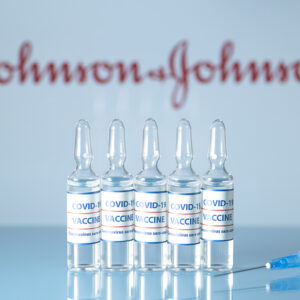Less than 72 hours after ordering “a round of J&J for me and my friends” at a mass vaccination clinic, Gov. Chris Sununu is halting the distribution of the Johnson & Johnson vaccine per federal guidelines.
“The State of New Hampshire has announced a pause on the use of the Johnson & Johnson (J&J) COVID-19 vaccine, consistent with the recommendation of the federal government,” the Governor’s Office said in a statement.
“This morning, the U.S. Centers for Disease Control and Prevention and the Food and Drug Administration recommended a pause on the use of the single-dose J&J COVID-19 vaccine after reports that six individuals in the U.S. developed a rare disorder involving blood clots within about two weeks after vaccination. The State of New Hampshire is working with all partners to ensure they are adjusting their operations to accommodate this pause,” the statement added.
But the current data show an extremely low risk of blood clots for the vaccinated when compared to the risk of bad health outcomes of COVID infection while unvaccinated.
Dr. Megan Ranney, Associate Professor of Health Services, Policy and Practice at Brown University, says the risk from the J&J vaccine — 6 out of 7 million thus far — should be put into context.
“First, reporting 6 cases of cerebral venous sinus thrombosis plus low platelets — the same complication observed with AstraZeneca — among 7 million doses administered, would never have been caught in a clinical trial. The rate is tiny, and no clinical trial involves millions of people,” Ranney wrote.
“And if you catch COVID-19, you have an approximate 20 percent chance of getting a blood clot, according to a recent systematic review, though the real rate may be lower. But compare 6 in 7 million to one in five. Science and medicine, like life, is full of weighing risks vs. benefits.
“Right now, the risk of catching COVID and having a bad complication is much higher than this very rare adverse effect, though that might not be true for some specific groups. But what is indubitably true right now is that COVID cases are rising in the U.S. and across the world, and the J&J vaccine is very, very good at preventing disease, and excellent at preventing severe disease and death,” Ranney said.
And statistician Nate Silver has also weighed in, tweeting, “Six cases out of 7 million people. What a disaster. This is going to get people killed. And it’s going to create more vaccine hesitancy. These people don’t understand cost-benefit analysis. They keep making mistakes by orders of magnitude.”
Former FDA Chief Dr. Scott Gottlieb agrees the decision to halt distribution will “fuel the hesitancy” and make it more difficult to convince reluctant Americans to get vaccinated. However, he’s more sympathetic to the FDA’s decision.
“Let’s start with what the FDA didn’t do,” Gottlieb told CNBC. “They didn’t revoke the emergency use authorization. They didn’t order this off the market. This was a requested pause, which is an awkward regulatory step, but I think it reflects the level of caution on their part to not to appear to act too forcefully here.”
And it’s important to note that the FDA isn’t ordering states to stop giving the vaccines. The Sununu administration could make them available to Granite Staters who’d rather have the shot than the risk from remaining unvaccinated. Or they could offer it but with additional health restrictions. (The state Department of Health and Human Services did not respond to requests for comment.)
ABC News reported Gov. Sununu raised the vaccine reluctance issue during a governors’ call with the White House. “I think what has to be appreciated is the ability for governors to reinstill confidence after something like this, is 100 times harder than putting the pause on in the first place,” Sununu told the White House.
Still, Sununu says, “this news will not slow down New Hampshire.”
“While the federal government has directed a brief pause in the J&J vaccine, the state is already working with our partners to ensure that they have an alternative supply of Pfizer or Moderna to help continue their efforts today,” Sununu said.
According to the Governor’s Office, no state-managed fixed sites have clinics scheduled to distribute the Johnson & Johnson vaccine. And the state is working to help private vendors like Walmart, who had Johnson & Johnson shots scheduled, to get an alternative vaccine by Tuesday afternoon.
“COVID-19 vaccine safety is a top priority and all reports of health problems following COVID-19 vaccination are taken very seriously. The CDC has indicated that those who have received the Johnson & Johnson vaccine who develop severe headache, abdominal pain, leg pain, or shortness of breath within three weeks after vaccination should contact their healthcare provider,” the Governor’s Office said.



